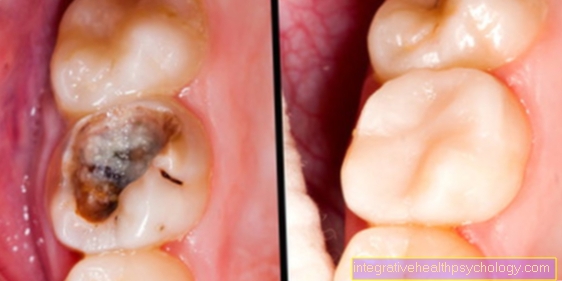Common cold during pregnancy
introduction
Colds are one of the most common diseases and so it is not surprising that a cold is by no means unusual during pregnancy.
As a rule, a simple cold is annoying and stressful, but not dangerous. It can catch almost anyone. There is a high risk of infection, especially in the cold, wet winter months, when the vast majority of people are virus carriers. This does not stop at expectant mothers.
In addition, up to 20% of all pregnant women have a chronic, long-lasting cold (Rhinitis in pregnancy), which some also count among the common colds in the broader sense.
But what exactly is the situation with a cold during pregnancy? What to do What things and drugs could be dangerous? And which doctor is the right contact person in this particular situation? All these questions about the common cold during pregnancy should be answered here.
Read more on the topic: Respiratory infection in pregnancy

Is a cold during pregnancy dangerous for the baby?
A common cold, as a rule, is not dangerous for the baby. A very high percentage of the common colds are caused by viruses and often affect the upper respiratory tract.
This means that the mother's immune system fights the infection sufficiently before the virus can affect the rest of the body. In addition, a cold during pregnancy even causes the baby to receive so-called nest protection. The mother's immune system makes antibodies to fight the viruses. Antibodies are small proteins that specifically recognize the virus and can trigger an immune response. These antibodies are also transferred to the baby, so that it has immune cells against the cold viruses even before it is born.
Caution should only be required if the cold is accompanied by a fever, which lasts for several days at around 39 degrees Celsius. Long-lasting fever can trigger premature labor and should be clarified by a doctor. In general, if the mother has a cold, she should ensure that she is sufficiently rested and hydrated, as pregnancy is an additional burden on the body. It may be that pregnant women need more rest. This is also important to prevent a second infection that can add to a normal cold.
Do you want to make sure that your baby is not at risk? - Then check out our main article on the topic: Is a cold during pregnancy dangerous for my baby?
therapy
A causal therapy, i.e. the one that corrects the problem, is unfortunately not possible for colds in general, as is the case during pregnancy. Because they are viral pathogens, antibiotics are also of no use (these only work against bacterial pathogens).
So what can you do now? The only way to treat it is to reduce the symptoms of the common cold, making the condition more bearable. A high fluid intake is extremely important here.
If the throat is not affected and irritated, most patients find hot tea most pleasant. In the event of involvement and inflammation of the throat and pharynx, lukewarm drinks are recommended so as not to further irritate the area.
Inhaling steam, which can be done with a special inhaler with a nose attachment from the pharmacy, but also over a simple pot of hot water to which a few drops of tea tree or chamomile oil have been added, helps against severe respiratory restriction and shortness of breath with swollen nasal mucous membranes.
If all of this is not in the house, it often helps to put two or three herbal tea bags in the water whose steam is to be inhaled. The hot steam causes the nasal mucous membranes to swell, which makes breathing much easier, and increases the outflow of mucus, which removes many viruses from the affected area.
You may be able to use mild pain relievers (special attention is required during pregnancy, detailed information in the instruction leaflet of the respective medication!); however, bed rest is most effective. All of the body's resources are needed to defend against viruses, so a lot of sleep and relaxation are the best bridges until the organism has helped itself.
Read more on the topic: Painkillers in Pregnancy
Nasal spray
Nasal sprays should be used extremely sparingly and carefully in any case of cold, but especially during pregnancy. It is best to only resort to them when there are no other options and the breathing restriction has become too severe.
Decongestant nasal sprays (with chemical agent) usually have a vasoconstricting effect. Since this effect is not limited to the mucous membranes of the nose, but can be observed throughout the body, there is a risk of the unborn child being under-supplied with oxygen. For this reason, doctors and pharmacists advise against the use of such drugs during the entire pregnancy, but especially in the first trimester.
When using the sprays for a period of time that longer than 10 days persists, there is also a risk of dependence.
In exceptional cases, therapy with a nasal spray can also be justified, for example if the pregnant woman can no longer sleep at night due to the swollen nose. In these cases you should pay close attention to the dosage of the drug and, if possible, use a nasal spray for small children, which is much lower in dosage.
In the first trimester of pregnancy or if you want to do without nasal sprays with active ingredients that constrict blood vessels altogether, nasal sprays based on sea salt or pure steam inhalation (see therapy) as measures that can be used without hesitation.
Alternatively, herbal active ingredients, so-called phytopharmaceuticals, or homeopathic remedies are also possible. They generally have few side effects and are also suitable for pregnant women. They do not cause any damage to the nasal mucosa even over a longer period of time.
The common cold is usually diagnosed clinically, i.e. through a physical examination, assessment of the patient's overall condition and a specific questionnaire (anamnese).
Cold bath
Cold baths during pregnancy are rather not recommended. On the one hand, a bath in hot water is stressful for the circulation and thus a further strain on the already weakened body. On the other hand, either essential oils or herbs are traditionally added to a cold bath.
Essential oils should be avoided during pregnancy, as they can promote labor and therefore the risk of premature birth. The same goes for some medicinal plants or herbs. Always consult a doctor if you are unsure.
Which drugs are allowed during pregnancy?
During pregnancy, any medication should be handled very carefully and many medications that would otherwise be used to fight the common cold are also prohibited. Many drugs, including those based on plants, pass through the placenta and enter the baby's circulation.
Paracetamol is a drug that is approved throughout pregnancy and also during breastfeeding. It can be taken to lower fever and as a pain reliever. The maximum daily dose for adults is 4000mg. However, only the lowest possible dose should be taken during pregnancy. If you are unsure, it is better to see a doctor and get individual advice.
Medications such as ibuprofen or ASA are not recommended during the entire pregnancy. In fact, they are strictly forbidden in the last trimester.
Herbal remedies, which are otherwise often used for colds, should also be taken with caution. Vegetable doesn't always mean it's safe for the baby. Consultation with a doctor or pharmacist should always take place before taking and, if in doubt, decisions should be made with caution.
These home remedies can help
Many simple home remedies can help relieve the symptoms of the common cold. The most important thing with a cold is a high intake of fluids. Herbal teas can be a good alternative to water here. The high fluid intake is therefore important, as otherwise the mucous membranes can dry out and further germs can settle more easily on dry mucous membranes.
You should keep away from ginger, however, as it can promote labor.
A nasal spray with table salt can be used to relieve the nasal congestion and the pressure in the sinuses. The table salt leads to a decongestion of the mucous membranes and thus reduces the pressure in the sinuses. Steam baths are also recommended to reduce swelling and moisten the nose and throat region.
These can either be mixed with table salt or, for example, thyme. If you are sensitive to allergies or have asthma, you should only inhale with table salt and not with other herbs.An increased intake of zinc (for example contained in oat flakes or pumpkin seeds) and vitamin C (e.g. citrus fruits) provide the immune system with important trace elements so that it can work effectively and is therefore also recommended.
Cold tea
Cold teas are useful if you have a cold during pregnancy in order to maintain a high fluid intake. However, care should be taken when choosing the ingredients. But the principle also applies: the dose makes the poison. Many of the negative effects of medicinal plants or herbs require high doses of them to be consumed.
Good and harmless options are, for example, chamomile, fennel, lemon balm, thyme or any kind of fruit tea.
You can find out more about this at: Cold tea - how do I best make it myself?
homeopathy
Homeopathy knows many different remedies for colds, which are tailored to the different symptoms. During pregnancy, you should generally be careful with medication and so with homeopathy. There is no good scientific evidence as to how homeopathic cold remedies can potentially affect the mother or baby. Therefore, a doctor with good expertise in homeopathy should always be consulted before a preparation is taken.
diagnosis
When making the diagnosis, the doctor will ask about typical symptoms and will also be interested in the period during which these have already existed.
The exclusion of a bacterial infection is always of great importance, which then has to be treated in a different way in the following and has different consequences, especially for pregnant women with possible antibiotic therapy.
Read more about this at: Cold caused by bacteria
There are some good and very safe antibiotics that can be easily tolerated and prescribed during pregnancy without endangering the unborn child, but all drug interventions should be kept to a minimum.
Read more about the topic here: Antibiotics in Pregnancy
The correct diagnosis is also important to rule out a correct "real“Influenza, which is caused by influenza viruses and which is much more severe and more complicated for the patient. Small children, the elderly and pregnant women are particularly at risk here and may need intensive medical care, including temporary inpatient monitoring in the hospital.
When should I see a doctor with a cold during pregnancy?
A cold doesn't necessarily have to be seen by a doctor. However, you should consult a doctor more generously during pregnancy and if you are uncertain about what to do with a cold in order to receive individual advice. Especially when there are uncertainties about taking medication. If the fever is high and persists for several days, a doctor should also be consulted.
Which specialist is my right contact person?
As with any cold, your family doctor is your first point of contact if you catch a cold during pregnancy.
He knows the current disease situation in the relevant region and knows what causes typical cases of disease at the moment and what can be done to alleviate the acute symptoms.
He can also examine other diseases and thus make important exclusion diagnoses (so.) put.
If he or she does not already know about the pregnancy, it can be helpful to point it out to him or her again.
As a rule, however, this results in (except for not using some medication) no consequences, because the treatment of a cold for pregnant and non-pregnant women is designed in the same way and the cold per se does not pose any acute danger to the child.
Nevertheless, in case of doubt, it is always advisable to visit a doctor, also because a doctor can correctly assess the severity of the disease and any further action that may be necessary (For example, calling in the gynecologist or another check-up appointment after a few days, ...) can plan with you.
A doctor should be consulted in the course of colds, especially if they have a fever. As a rule, the family doctor can advise the pregnant woman well which drugs and measures are safe and which are not. Depending on the agreement with the gynecologist, this can also be visited immediately. In addition, if symptoms associated with pregnancy occur, such as bleeding or premature labor, you should definitely consult your gynecologist.
Should I go to work with a cold while pregnant?
Pregnant women with a cold cannot be banned from working. However, the recommendation goes in the direction that pregnant women should rather be more generous on sick leave in order to give the body time to cure the cold.
For a pregnant woman, rest is even more essential in the case of a cold than for women without pregnancy, as pregnancy in itself is a burden on the body. We also know that it is easier for secondary infections to take hold if the body is not sufficiently spared. The common cold is usually caused by viruses.
A second infection can also be triggered by a bacterium and is a serious illness, as it can also be dangerous for the child. Furthermore, stress at work can add to the already weakened body in such a way that premature labor can be triggered. Another reason not to go to work when you have a cold is the risk that people around you can get infected. Above all, workplaces where many people work together in a confined space are particularly at risk, as pathogens can spread very quickly due to poor hygiene and poor air conditions.
Read about this too How long is a cold contagious?
Duration
An uncomplicated cold begins slowly with the first symptoms, which increase over a few days. Most symptoms usually go away after about a week. It is important to know that coughing typically only occurs later in the course of a cold and lasts for an average of 18 days, even when all other symptoms have completely subsided.
During pregnancy, the course can also differ from the classic cold. Therefore, a lot of rest is essential, especially during pregnancy, so that the body can fight the infection effectively.
forecast
Last but not least, the question arises whether a cold during pregnancy can be dangerous for mother and / or child. It should be said that a normal, uncomplicated cold is annoying and exhausting and represents an additional burden for the pregnant woman's body, but is in no way to be assessed as acutely threatening.
Usually symptoms are all after 3-5 days healed by itself. Adults pull themselves on average about three times a year catch a cold even more often in children because their immune system cannot yet fully protect them from all viruses. There is always a risk if you have a bacterial superinfection (In addition to the viruses that have attacked the body, bacteria are also added) suspects a fever with temperatures above 39 degrees or no improvement after more than a week.
With these symptoms, but also with unusual pain (For example, if you have severe ear pain or pain in the forehead area and under the eyes) you should consult a doctor. Even in the case of a harmless, self-limiting illness, if you have a pronounced cold, you should make sure that the illness is completely cured: if the illness is dragged on or if the body is stressed too quickly, there is a risk of further inflammations such as in the middle ear, the lungs or in the pleurisy area or permanent stress on the heart due to myocarditis.
Symptoms
The classic symptoms of a cold or a flu-like infection include tiredness and fatigue, a swollen, stuffy nose that produces an excessive amount of mucus, which then runs out and makes breathing more difficult.
Headache, possibly accompanied by a feeling of pressure on the temples, forehead or cheeks, as well as a reduction in the performance of the sense of smell and taste, which is often associated with loss of appetite, and a slight tickly cough with a sore throat and reddened, irritated tonsils in the throat are physical signs. Last but not least, painful swollen lymph nodes and, under certain circumstances, fever or an unusually strong sensitivity to cold (freeze to chills) noticeable.
Read more about this under Symptoms of a cold
causes
As with other colds, the reason for a cold during pregnancy is usually a viral infection, which can vary depending on the season and the region.
The infection takes the form of a so-called droplet infection, i.e. the viruses are found in the air we breathe or in the finest droplets that are thrown out of the nose, mouth and throat when coughing or sneezing. These also stick to hands and then to door handles, handles on the bus or the like and from there to the hands of others, to the mucous membranes and finally settle there as well.
Frequently there are repeated reinfections, which either run in circles over the partner, own children or other close people or even lead to a repeated "Self-infection“- for example, about used handkerchiefs, which are still used in the first phase of healing.
Any droplet infection is therefore always accompanied by a rapid infection of many people in the same period, since a very large spread of the viruses and thus poor controllability can often be observed.
prophylaxis
A general strengthening of the immune system is a good way to prevent a cold from occurring. You should pay attention to sufficiently warm clothing and avoid drafts. If possible, you should never freeze. The hands and feet in particular should be kept warm, because the temperature of these body parts has a direct effect on the temperature of the mucous membranes and thus on their immune system.
Cold, chipped mucous membranes are subsequently a weaker barrier against viruses. In addition, fresh air is very beneficial; regular, short walks are best. Just like exercise outdoors, a vitamin-rich, balanced diet and plenty of fluids can also help.
Read more on the topic: Diet during pregnancy
During the popular cold season, you should wash your hands more often than normal and, if possible, reduce handshaking to a minimum.
Last but not least, regular relaxation phases and a sufficiently good sleep are also important against colds, because the human body is much more susceptible to diseases of all kinds in stressful situations and with lack of sleep and fatigue due to a slight suppression of the immune system.
Read more on the topic: Sleep disorders in pregnancy
In particular, patients who are more prone to infections can also consider whether they would like to use a herbal preparation to strengthen the immune system. Most of these active ingredients can also be recommended for pregnant women without restrictions. Your family doctor can give you a good recommendation for such products.
Can a cold also be a sign of pregnancy?
A cold is not one of the typical signs of pregnancy. However, the symptoms of a cold can be similar to those of early pregnancy. These are, for example, tiredness and fatigue, as well as nausea. A safer sign of pregnancy is the lack of menstrual bleeding and a positive pregnancy test.
You might also be interested in the following articles: How do I get pregnant?















.jpg)













